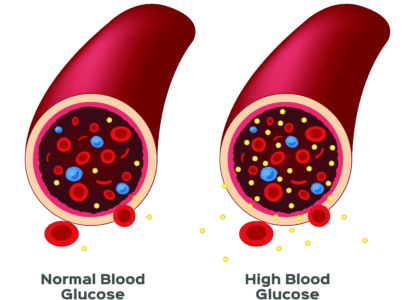Are Transglutaminase 2 IgG Antibodies Evidence of Gluten Sensitivity?

Contents
Most people believe the world of gluten can be broken down into two groups: celiac, and everyone else. However, an emerging scientific consensus would indicate there is a need for a third group: those who are “gluten sensitive.” But what does this mean? Can lab testing prove gluten sensitivity absent full blown celiac celiac disease? Where is the dividing line?
Diagnosing celiac disease
We score for celiac genes as part of our custom nutrition plans. If you don’t have the genetic markers for celiac, it is very unlikely that you have celiac. but celiac can’t be ruled out with a genetic test alone.
As such, diagnosing celiac disease starts with blood tests. Celiac tests measure whether your body has an immune reaction to, among other things, tissue transglutaminase (“tTG”). This New York Times blog by Dr. Sheila Crowe, offers one of the best explanations we’ve heard of why elevated tTG antibodies are significant when diagnosing an issue with wheat:
One protein is an enzyme called tissue transglutaminase, or TTG, that is found in many cells of our body. TTG is released from the damaged intestine during active celiac disease, and antibodies to TTG are found to be elevated in the blood of most patients with untreated celiac disease.
So, the bottom line is we all have some tTG enzymes, but those levels increase with intestinal damage caused by celiac. In response to the damage, the body releases antibodies, and it’s those elevated antibodies that raise the suspicion of celiac in a diagnostic setting.
IgA antibodies are the gold standard in detecting celiac disease since they’re produced in the small intestine, and it’s ultimately the small intestine where a subsequent biopsy will confirm celiac disease.1 It should be noted here that some physicians believe elevated tTG IgA is all that is needed to confirm celiac and the biopsy is no longer needed because the IgA marker is so predictive.1 In fact, tTG IgA antibodies are unique to celiac disease.2
However, most wheat panels don’t stop at tTG IgA antibodies, they also look for another type of antibody called IgG. For example, it is possible that tTG IgG antibodies can be present even when the small intestine focused tTG IgA antibodies are nowhere to be found.
What is the meaning of a blood test that shows a negative result for tTG IgA, but shows a positive result for tTG IgG? Could this distinction be what clues a physician in that she id dealing with gluten sensitivity vs. full blown celiac?
Difference between tTG IgA and tTG IgG antibodies?
IgA and IgG are both types of immunoglobulins, which are antibodies the body releases to neutralize invaders, like bacteria and viruses. This WebMD article does a nice job explaining the difference between IgA antibodies (which are specific to the nose, ears, breathing passages, digestive tract and vagina), and the IgG antibodies, which are more generalized, and are found in all the body’s fluids.
tTG IgA antibodies
This stands for tissue transglutaminase immunoglobulin A. tTG IgA are unique to celiac disease, and are produced in the small intestine where celiac wreaks havoc.
tTG IgG antibodies
This stands for tissue transglutaminase immunoglobulin G. It’s not clear based on what I’ve read whether tTG IgG antibodies are unique to celiac disease, but we can assume they are generalized antibodies found generally in the body, rather than in the small intestine. This is a really interesting forum thread discussing the implications of tTG IgG positive test results. To quote one person’s experience with her son:
My son tested negative on all tests except the IgG ones and he was found to have extensive damage even though he had very few symptoms. He was NOT IgA deficient. While researching Celiac (before his endoscopy) I found a book that had a chart of all the blood tests and where they lead. If I remember correctly, a positive result on the TTG IgG lead to “gluten intolerant” with the next step being an endoscopy to look for celiac damage. At the very least, though, you could pretty much count on being gluten intolerant.
Two things are important to keep in mind with this quote. First, this mother refers to IgG plural, because there are three tTG IgG markers that can be tested tTG 2, tTG 3, and tTG 6.
This post seeks to answer the implications of tTG 2 antibodies being present in the blood, mainly because I saw labs where every single celiac marker was negative expect tTG 2 and my doctor had no idea why. Second, there is an emerging perspective that says a negative tTG IgA can be a false negative, if the patient is IgA deficient.
IgA deficiency and celiac false negatives
To be on the safe side for my own blood work, I started with a total serum IgA test to rule out a false negative on the rest of my celiac blood work, and this is probably a prudent first step for those who suspect an issue with wheat, but have had negative tTG IgA tests.
I was able to get my total IgA test done at Any Lab Test Now in Austin for $69 and the results were normal. This rules out a false negative for me and puts me into the gluten sensitive camp. To quote Dr. Crowe again:
In some cases, the TTG IgA test result can be “false negative” – that is, results come back negative, even though celiac disease is actually present. False negatives can occur for various reasons, but the best known cause is a condition called IgA deficiency that people are born with. This immunodeficiency occurs in about one in 600 healthy individuals but is much more common in those with celiac disease.
Interesting that the mother in the forum thread above says her son had small intestine damage despite having normal IgA levels, and only positive IgG markers for tTG. Dr. Crowe only briefly touches on tTG IgG tests in her NYT piece:
Occasionally your doctor may order other blood tests, such as TTG IgG or DGP IgG, if they are available.
This study analyzed tTG IgG levels in IgA deficient patients. The authors believe positive tTG IgG results, combined with negative IgA results, is evidence of IgA deficiency, and potentially of celiac disease.
While the presence of IgG-tTG seems to be of limited diagnostic value in IgA-sufficient celiac patients, the presence of these antibodies without IgA-tTG might be a sign of IgA deficiency. Detection of IgG-tTG is highly compatible with the presence of IgG-EmA and may improve the possibility of identification of celiac disease in patients with IgA deficiency.
The lesson here is that you need to know your serum IgA levels in order to properly read your celiac blood work, especially tTG IgG.
The tTG IgA biopsy bias
There is a rightful bias against recommending patients undergo a biopsy of the small intestine because it is such an invasive procedure, and I cited this 2017 study above from the Journal Gastroenterology, which found the IgA testing so predictive as to make biopsy unnecessary.
However, it is still generally agreed that only through a biopsy can a diagnosis of celiac can be confirmed. If you haven’t been eating gluten, your blood may not show tTG antibodies, and your body may have healed to the point where damage to the small intestine abates.
Since tTG IgA is the gold standard, the lack of these antibodies likely won’t result in the recommendation of a biopsy. However, this does not mean that gluten is not causing some kind of autoimmune reaction. Remember, the tTG antibodies (both IgA and IgG) are elevated as the result of damage to the small intestine, and the only way to confirm that damage is biopsy, which most won’t do.
In light of this fact, there are people out there who have reactions to wheat, and who are not diagnosed as celiac, but who can credibly say they are gluten sensitive because they have the blood work to prove it. Where serum IgA levels are low, tTG IgG can be a potential sign of celiac.3 Where serum IgA levels are normal, as was the case with me, they’re a sign my body does not like gluten.
Since I am unwilling to eat gluten for a few weeks to induce damage so an accurate biopsy can be performed, I won’t know the exact level of damage gluten is doing to my system. My solution is to abstain from eating gluten based on my positive tTG 2 IgG results. At the end of the day, whether we’re classified as celiac or gluten sensitive, there is no way of knowing what wheat is doing to your small intestine without an endoscopy. No one is claiming that it’s impossible for the gluten sensitive to see small intestine damage after eating wheat, and there’s a lack of evidence since most with inconclusive blood work won’t do a biopsy.
Why a Gluten Free Diet may not be Enough to Heal the Gut Is Celiac Disease Genetic? The Future of Food Sensitivity Testing




I just tested negative on my iGA and positive on my igG, this is so frustrating because I know for a fact that when I eat gluten containing foods I suffer, badly! I am on a gluten free diet for the most part, my doctor never told me that I need not be before doing my blood work so I may have a false negative as far as the iGA goes, is that even possible? I’m scheduled for an endoscopy next week for gastritis and I’m hoping they look at my small intestines also to see if there is any damage. I’m so frustrated right now.
My 9 year old son has a TTGa of 5 and IGA of 149. Is this considered positive? I took him off gluten and his symptoms disapperead 1.5 weeks later.
I had the Array 3x test done and it came back of out of range (3.75) allergic to Transglutaminase-2 lgG can you please explain to me what this means?
Do I have celiac?
Hey Tina, there is no way to know without an endoscopy. It probably indicates gluten sensitivity, not celiac, but that is a conversation to have with your doctor because, as some of the comments here have pointed out, some people find celiac like damage after only an IgG positive test.
My daughter was only positive on the ttg igg test and it was weak positive. Her doctor told me that she didn’t think it was celiac, but since she has been so sick, they decided to scope her to see if she had something else going on. Her scope looked normal with a bit of inflammation so they took biopsies of that area…it came back positive for celiac. This has been three months of back and forth with the doctor but we are happy to finally have a diagnosis so we can get her feeling better
Fascinating, thank you for sharing Melissa. I have heard multiple stories like this now. Positive IgG, negative IgA, and then a confirmation of celiac when they do an endoscopy. Kind of scary to think that many people with the negative IgA are sent home clear of celiac, when they actually have it.
Thank you. Best discussion on this that I have seen. The tTG IgG was my only positive antibody test. I am IgA sufficient. DQ 2.2. Doctor was reluctant to label me celiac but I went gluten free and those antibodies disappeared. Clearly gluten is a problem for my body. I think science has not got the realm of gluten problems completely figured out.
I to my knowledge never had any symptoms. This is why I am so confused. I had the test done due to miscarriages. I had the celiac panel again six months later to re check it. Now again it’s the same. All tests are negative except the weak positive 6 for the range of 0-5 negative. 6-9 weak positive and over 10 positive. So confused.
I just recently had blood work done. My tTG IgA was <2, Negative is 0-3.
And my tTG IgG was 6 with 0-5 being negative and 6-10 being weak positive, and 10 or higher being positive. Can you tell me what this means? Thank you.